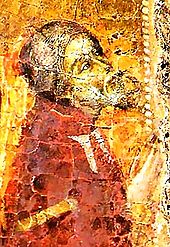Juan Manuel
Juan Manuel (as author Don Juan Manuel) (born May 5, 1282 in Escalona , Toledo Province ; † June 13, 1348 at Peñafiel Castle , Peñafiel , Valladolid Province ) was a Castilian statesman and writer . As the latter, he is considered to be one of the main representatives of medieval prose in the Castilian vernacular . He inherited the rule of Villena from his father and was given the titles of "Lord", "Duke" and finally "Prince" of Villena. He was also the landlord (señor) of Escalona, Peñafiel, Cuéllar , Elche , Cartagena , Lorca , Cifuentes , Alcocer , Salmerón , Valdeolivas and Almenara . In addition, he was Mayordomo of Kings Ferdinand IV and Alfonso XI. as well as Adelantado Mayor of Andalusia and Murcia .
Life
Juan Manuel was born as the son of the Infante Manuel of Castile and his wife Beatrix of Savoy and thus belonged to one of the richest and most powerful families of the Castilian nobility . At the age of five he lost both parents, and when he was twelve he took part in his first campaign to repel the Moorish siege of Murcia . Juan Manuel enjoyed a chivalrous upbringing in the style of his time (hunting, riding, fencing), but was also very interested in intellectual disciplines such as law , history and theology . With his kings Ferdinand IV and Alfons XI. Juan Manuel was in a tense relationship. He married his daughter Constança Manuel at the age of seven to Alfonso XI, who had just come of age at the age of 14, and whose teacher he was at times. After the latter had the marriage annulled two years later, he married her to the Portuguese Crown Prince and later King Pedro . He died in 1348; his tomb with a reclining figure is in the San-Pablo church in Peñafiel, which he built.
He left a sizable but widely dispersed estate that the Catholic Monarchs made the Duchy of El Infantado in 1475 .
plant
Eight books by Don Juan Manuel (author's name) have come down to us, including his most famous, El Conde Lucanor , a dialogical collection of 51 stories ( Exempla ) with moralizing intentions compiled from 1330 to 1335 - i.e. about 20 years before Giovanni Boccaccio's Decameron . which mainly draws on elements of the ancient and Arabic storytelling tradition. It also contains the template for Hans Christian Andersen's famous fairy tale The Emperor's New Clothes .
Don Juan Manuel wrote in the Castilian vernacular rather than Latin in order to get the maximum number of readers. His original role models can be found in the anonymous compilations of his uncle, King Alfonso X of Castile , who was nicknamed "The Wise". In the course of his literary development, Don Juan Manuel increased the didactic and moralizing element.
buildings
In the towns of Cifuentes , Trillo , Salmerón , Almansa and Villena along the Ruta de la Lana , he had castles (castillos) built around 1325 . The former city palace in Belmonte can also be traced back to him.
literature
- Hans-Heinrich Reuter (Ed.): The Count Lucanor. From the Spanish by Joseph von Eichendorff. Insel Verlag, Leipzig 1961.
- Ángel Benito y Durán: Filosofía del Infante Don Juan Manuel. Sus ideas, su cultura, su espíritu filosófico. Excma. Diputación Provincial de Alicante, 1972.
- David Flory: The Count Lucanor. Don Juan Manuel within his historical context. Pliegos, Madrid 1995, ISBN 978-84-88435-20-0 .
Web links
- Literature by and about Juan Manuel in the catalog of the German National Library
Individual evidence
- ↑ Aurelio Pretel Marín, Miguel Rodríguez Llopis: The Seigneury of Villena in the 14th Century (= Series I - Estudios . Band 104 ). Instituto de Estudios Albacetenses "Don Juan Manuel", 1998, ISBN 84-87136-86-9 (English, limited preview in the Google Book Search - Spanish: El señorío de Villena en el siglo XIV . 1998).
| personal data | |
|---|---|
| SURNAME | Juan Manuel |
| BRIEF DESCRIPTION | Castilian statesman and writer |
| DATE OF BIRTH | May 5, 1282 |
| PLACE OF BIRTH | Escalona , Toledo Province |
| DATE OF DEATH | June 13, 1348 |
| Place of death | Peñafiel |
